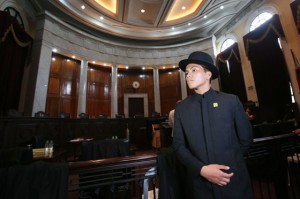The Rizal Park and the Rizal Monument “represent the soul of the nation … remove the park, then you don’t have that anymore.”
Justices of the Supreme Court heard this statement on Tuesday as they started listening to oral arguments against the construction of the controversial Torre de Manila high-rise building in Manila’s Malate district that heritage conservationists want demolished for allegedly ruining the view of the park named after national hero Jose Rizal.
William Jasarino, counsel of petitioner Order of the Knights of Rizal, made the statement during the opening round of the oral arguments set by the High Court after it issued a temporary injunction stopping DMCI Homes from continuing with the project.
Jasarino said they fear that should the residential tower be allowed to be completed and not demolished, the view of the skyline behind the Rizal Monument would be blocked by more buildings and structures as planned by DMCI when they made a media presentation after the SC issued the TRO.
“Ito ang aming kinatatakutan, na dadami pa ang building katulad ng Torre de Manila [This is what we fear, more buildings similar to Torre de Manila would sprout],” he added.
“With the presence of high-rise buildings, outdoor advertisements will also proliferate. Can we now say nothing bad will happen in the future?” Jasarino said in Filipino.
Chief Justice Maria Lourdes Sereno and Associate Justices Arturo Brion and Bienvenido Reyes were on leave when the regular en banc session opened to hear the Torre de Manila case.
Sereno is on leave until July 31.
The Manila Times earlier reported her possible conflict in the case as her husband, Mario, was once connected with a company of the Consunji group with which DMCI is affiliated.
SC spokesman Theodore Te had confirmed this paper’s report but said Mr. Sereno’s case is not a ground for the Chief Justice to inhibit from the case.
Mr. Sereno resigned from the Consunji company in July 1989.
“The supposed connection of the [Chief Justice’s] spouse to a party in a pending case is not a ground for mandatory inhibition; note also that the connection ceased 26 years ago,” Te said in an earlier statement.
Associate Justice Jose Perez also recused from the case as his children bought units in the controversial condominium.
During questioning by Associate Justice Estela Perlas-Bernabe, the petitioner’s counsel blamed the Manila city government and DMCI for the mess.
Jasarino claimed that DMCI knew from the start that a city ordinance only allows the construction of 7-story buildings in the area but they made a plan for a 49-story structure.
Moreover, he blamed former Manila mayor Alfredo Lim for approving the building permit without an exemption.
“From the very beginning DMCI knew that only 7-story buildings are allowed but they planned for a 49-story building … Mayor Lim committed an infraction of law when he granted a permit without securing process of exemption,” Jasarino told the High Court.
He said there was bad faith on the part of City Hall after it granted DMCI an exemption to the restriction.
DMCI faces another probe
With the Torre de Manila controversy still far from resolution, DMCI will possibly be facing a separate congressional inquiry, this time to answer for its coal-fired power plant in Narra, Palawan.
Party-list representatives Neri Colmenares and Carlos Zarate of Bayan Muna and Luz Ilagan of Gabriela filed Proposed House Resolution 2164, which questions the decision of the Palawan Council for Sustainable Development (PCSD) granting DMCI a permit to operate a 15-megawatt coal–fired power plant in the area without considering the issues on social acceptability and environmental, health and safety risks to Palawan’s communities and ecosystems.
Zarate said the PCSD seems to forget its mandate to protect the province’s environment by regulating polluted industries to ensure environmental protection and the well-being of the people, considering that coal is one of the dirtiest sources of fossil fuel energy and a major source of global carbon emission or 44 percent of global carbon dioxide emissions in 2012.
“Palawan has a power reserve of 16.7 megawatts (MW) or 45 percent--more than the capacity of the coal-fired power plant owned by DMCI and making the establishment of a coal-fired plant in the province unnecessary,” he argued.
“DMCI’s coal-fired plant might even worsen the power crisis in Palawan due to the incompatibility with the existing infrastructure,” Zarate said.


